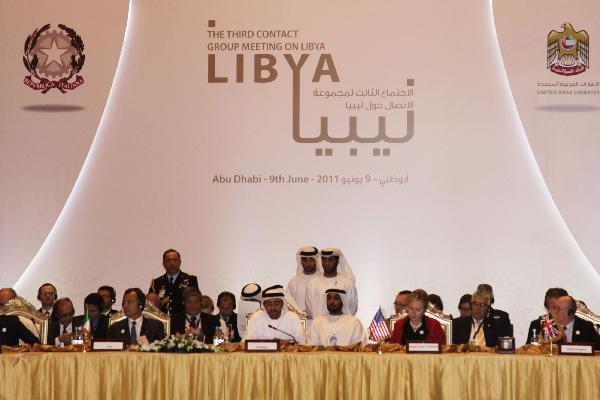UAE hosts international meeting over Libya
The Unites Arab Emirates (UAE) hosted the third meeting of the Libya Contact Group on Thursday, with some 20 foreign ministers and representatives of regional and international organizations attending, the state news agency WAM reported.
 |
|
Participants attend the third Contact Group Meeting on Libya, in Abu Dhabi, capital of the United Arab Emirates (UAE), June 9, 2011. UAE hosted the third meeting of the Libya Contact Group on Thursday, with some 20 foreign ministers and representatives of regional and international organizations attending. [Ma Xiping/Xinhua] |
In a keynote address to the meeting, held in the UAE capital of Abu Dhabi, UAE Foreign Minister Sheikh Abdullah bin Zayed Al Nahyan stressed the vital importance of Libya's territorial integrity, saying Arab nations should play a central role in supporting the Libyan people.
"We are seeking to keep that role prominent and reflective of the fraternal solidarity with our brethren in Libya," he told the participants from the Gulf Cooperation Council, the Arab League, the Organization of the Islamic Conference, the United Nations, the African Union, the European Union and NATO.
"Days, weeks and months have proven that the Transitional National Council is the representative of the Libyan people and the voice that expresses their aspirations for a bright tomorrow. We hail the council's efforts to bring all areas under the consensus towards a new, united Libya looking forward confidently to the future," Sheikh Abdullah added.
He noted that the council is in a desperate need for more political and economical support from the international community, saying the Abu Dhabi meeting had made an important breakthrough in removing some obstacles which hinder the temporary financial mechanism to enter into force.
"The financial mechanism is now ready to receive financial commitments from countries," the UAE foreign minister said.
During the meeting, co-chaired by Sheikh Abdullah, Italian Foreign Minister Franco Frattini and U.S. Secretary of State Hillary Clinton, the participants reiterated their support for the Transitional National Council and the Libyan people.
They also called for the establishment of an international mechanism to unfreeze Libyan state assets, formerly controlled by Libyan leader Muammar Gaddafi's regime, to serve the Libyan people's interests.
At the meeting, Sheikh Abdullah, Frattini and Mahmoud Jibril, interim prime minister of the Libyan Transitional National Council, signed an agreement enabling the temporary financial mechanism to receive financial pledges.
According to WAM, Kuwaiti Foreign Minister Sheikh Mohammed Al Salim Al Sabah announced that his country would transfer 180 million U.S. dollars to Libya's rebels. Italy also pledged assistance worth up to 400 million euros (580 million dollars).
 0
0 






